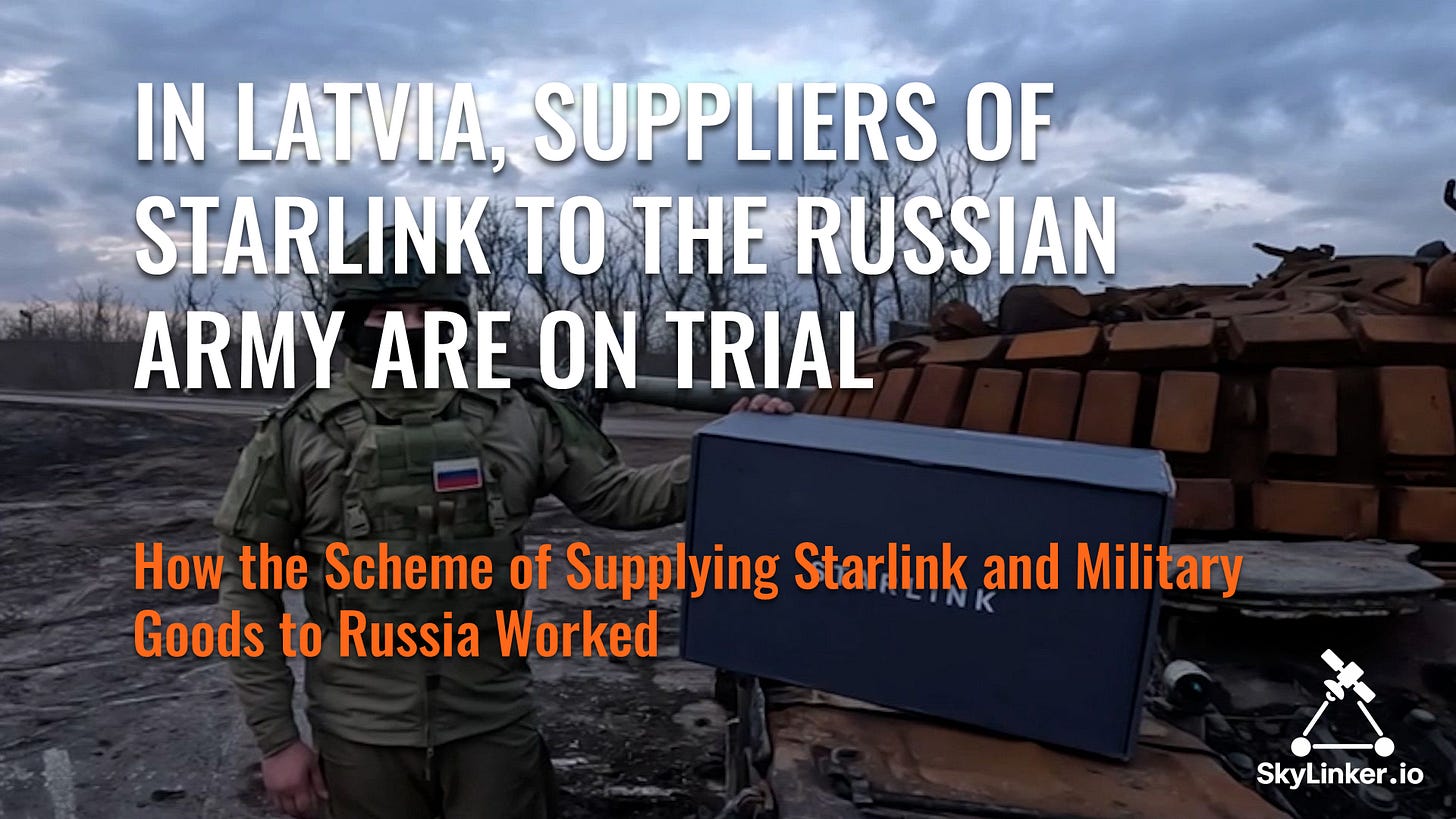In Latvia, Suppliers of Starlink to the Russian Army Are on Trial
Young Latvians in the Dock: How the Scheme of Supplying Starlink and Military Goods to Russia Worked
A high-profile trial is unfolding in Riga, symbolizing how thin the line remains between civilian business and war. In the dock are four young people — three Latvian citizens and one Azerbaijani citizen. The prosecution accuses them of large-scale deliveries of goods that ended up in the hands of the Russian military, including in the war zone against Ukraine.
The Beginning of the Story
It all started in the summer of 2024. According to the investigation, Azerbaijani citizen Ali Khalilov, who lived in Riga, set up a channel for purchasing equipment and gear in demand by Russian security forces and volunteer units. He was assisted by three Latvians: Danilo Goculyak, Alens Navickas, and Maria Mikheeva.
The roles were clearly divided: Khalilov was the organizer, the others carried out specific assignments. They opened bank accounts, purchased goods, received parcels, and arranged transportation. Within a few months, the group formed entire batches of goods that went from Latvia through Europe to Russia.
In total, about twenty people are mentioned in the case — identified and unidentified, who may have acted as accomplices and intermediaries, making the scheme much broader than the four main defendants.
What Exactly Was Supplied
The investigation cites a long list:
Starlink satellite communication terminals,
optical sights,
weapon frames,
weather stations with ballistic calculators,
chronographs for measuring bullet speed,
military backpacks and other equipment.
The total amount of purchases reached about 200,000 euros. Latvian journalists discovered that a separate invoice from an American company amounted to almost 100,000 euros.
How the Scheme Worked
Goods were registered under different names and companies, and for transportation they used ordinary drivers of trucks or minibuses who agreed to take an “additional load.” The sets then ended up in Russia and were handed over to customers.
The investigation revealed that the group purchased over 60 Starlink Mini Kit sets. But for them to work, not only the “dish” was needed, but also a paid account in the SpaceX system.
According to court materials:
Khalilov and his accomplices negotiated with buyers in Russia not only for the supply of equipment, but also for the transfer of account login data.
In some cases, they themselves took on the activation and payment of the Starlink service so that clients in Russia would receive a “ready-to-use” terminal. At the same time, SIM cards with European phone numbers registered to fictitious persons were used.
This increased the price of the deals and made the goods especially valuable for military units.
One episode that impressed journalists — 45 Starlink sets that ended up at Moscow’s “Gorbushka” market. According to the prosecution, the buyer was linked to the “Akhmat” unit. Other devices were supposed to go to occupied Luhansk.
Exposure and Arrests
The active phase of activity lasted from June to October 2024. It was then that Khalilov was arrested. During searches in Riga, unrealized Starlink sets were found. The main defendant was taken into custody, while the rest were given milder preventive measures.
In July 2025, the case was transferred to the Riga City Court. At the very first open hearing, the prosecutor read the indictment for over an hour. The trial will continue in the autumn, and Khalilov could face up to 10 years in prison for sanctions violations alone.
Similar Cases in Europe
This trial in Latvia is not unique. Similar attempts have been recorded in other European countries:
Lithuania (2024–2025): local media reported attempts to smuggle Starlink through Belarus into Russia; Lithuanian customs seized equipment at the border several times.
Poland (2023–2024): investigations uncovered the use of front companies to purchase Starlink, which then illegally ended up in Russia via third countries.
Germany (2023): customs authorities discovered a batch of Starlink declared as “civil communication devices” destined for Russia through an intermediary in Kazakhstan.
The overall trend is clear: Starlink has become one of the most valuable resources for the Russian military, and thus the target of constant smuggling schemes in Europe.
Conclusion
This story shows how attractive access to Western technologies and equipment is for the Russian military — particularly European Starlink terminals and accounts. For Latvia, this trial became a signal: even small groups inside the country can turn into part of a large network of supply to the enemy.
Sources
https://www.lsm.lv/raksts/zinas/latvija/21.09.2025-apsudz-jauniesus-par-precu-pardosanu-krievijas-armijai-ar-verienu.a583692/
https://jauns.lv/raksts/zinas/598955-tris-latvijas-pilsoni-apsudzeti-par-precu-piegadi-krievijas-armijai
https://nra.lv/latvija/konflikti-un-noziegumi/445318-kriminallieta-par-interneta-sistemu-nodrosinasanu-krievijas-armijai-nonakusi-tiesa.htm
https://sanctions.duanemorris.com/latvia-to-prosecute-four-for-exporting-starlink-mini-kits-to-russia/
https://lsm.lv/raksts/zinas/latvija/09.07.2025-drosibas-dienests-parniedz-prokurat-kriminallietu-par-formas-telu-piegadi-krievijai.a580977/
https://www.tvpworld.com/1461398820/latvia-charges-local-company-for-violating-russia-sanctions



https://ilonaragana.substack.com/p/father-has-not-seen-his-children?r=2rp6x8